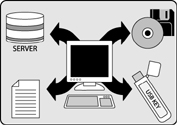Computer Security Tip: Regular Backups of Data
 What is it? Creating a second copy of your computers? files on a consistent basis.
What is it? Creating a second copy of your computers? files on a consistent basis.What risks are involved? If you don't back up your data you run the risk of losing it. Your files could disappear due to a virus, computer crash, accidental keystroke, theft, or external disaster.
What can I do to protect myself?
- Back up critical and essential files on a daily basis and non-critical files on a weekly or monthly basis. You can back up your data to a CD, to an online back up service (for a small monthly fee), flash drive, USB key, or to a server, if you can get access to one from your Internet Service Provider or commercial vendor. Some companies offer automatic backups when you purchase their programs.
- Keep all your critical files in one place so you can easily create a duplicate copy.
- Store your backup media (CDs, disks, backup server, etc.) in a safe and secure place away from your computer, in case of fire or theft.
- Periodically test the capability to restore from the backup media. It's of little value to have a backup that is unreadable.
- On campus: Check with your department's tech-support person to find out if he or she runs regular backups of departmental computers.
